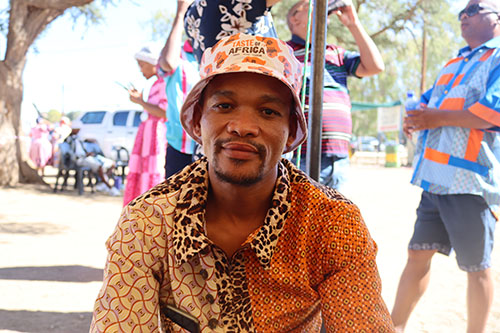Steven Klukowski
KEETMANSHOOP – The recently ended annual Nama Cultural Festival hosted Nama visitors from Botswana and South Africa who expressed admiration for Namibia’s recognition of their culture and language.
Nichodimas Cooper, a member of the Botswana Nama Development Trust said they (Namas in Botswana) are not recognised as one of the population groups according to that country’s constitution, but rather as part of some small minority groups living there.
He raised this concern when interviewed by New Era during the recent festival in Keetmanshoop last weekend.
“Already small in numbers in a foreign country, we are contrary to the situation in Namibia, in addition having the challenge of our youth not willing to accept and embrace their Nama customs and traditions,” he explained. He added these youngsters feel ashamed and have fear of being mocked when speaking their mother tongue (Khoekhoegowab) in public.
“By virtue of being a Nama in the first instance, I have decided to join this year’s festival as was the case with the previous ones,” said Cooper. He added that it is customary for Namas in Namibia, South Africa and Botswana to invite each other to their respective cultural festivals to compare their values and norms and in doing so strengthen the Nama culture. “It is through interventions such as these that we, as elders are trying to attract our youth to participate and take pride in their tradition,” he said.
Cooper commended the organising committee of the festival for a job well done and indicated that he will definitely propose back home that a traditional wedding should also be included during their next cultural festival.
Another visitor, Alexandra Beukes, who hails from Pella in the Northern Cape (South Africa) said, after attending the previous cultural festivals in the //Kharas region, she regarded this year’s edition as more organised, also depicting the Nama cultural values and traditions in a more broader spectrum.
“As a Nama, I further observed that the self-pride of the Nama population is very high here, which is good in the sense of promoting solid social relations amongst them,” said Beukes.
She continued that the panel discussions she attended as part of the festival were very informative and that she will definitely share the additional knowledge gained about their forefathers, like Hendrik Witbooi and Jacob Marenga with her people back in Pella.
Beukes also said learners in her community are reluctant to accept the importance of the Khoekhoewogab language and that it is a challenge for authorities to implement it in their educational curriculum as a subject.
“Although the Northern Cape province is in a twinning agreement with their Namibian counterparts in sending students from-and-to both countries to universities to learn more about their language, culture, tradition and customs, it is quite disheartening that only four of our students have shown interest and are now studying in Namibia,” she explained.
She also said, as in the case of Botswana, the Nama youth in their communities are shy and reluctant to live out their customs and traditions and are more turning to Western, modernized living styles. Beukes also said she was impressed with the way how the festival’s organising committee incorporated a real Nama traditional wedding in its programme this year.
Theresa Mertens, a Master’s student, hailing from Austria, doing her research in development studies including the Nama/Ovaherero genocide said it was really a great privilege for her to attend the Nama festival this year.
“It is quite amazing to see so many people from the different Nama clans gathering here for a great celebration of their cultural values,” she added.
Mertens continued that the traditional wedding for her was the highlight of the festival and hope the Nama youth who attended the festival could learn more about their culture from it.



